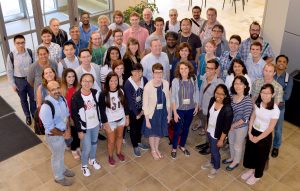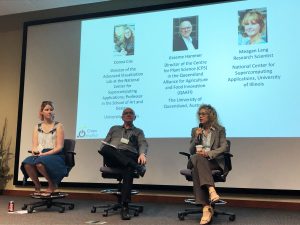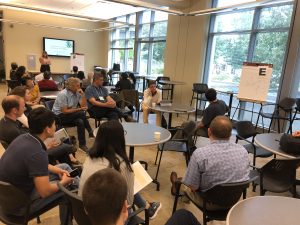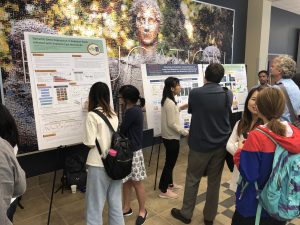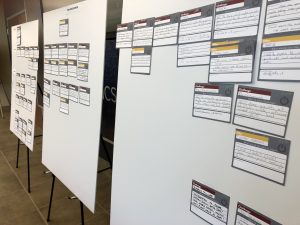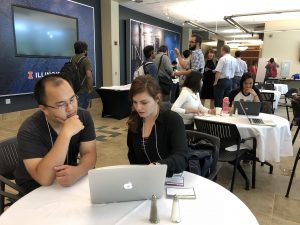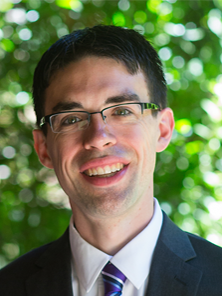
3rd Annual Crops in silico Symposium & Hackathon
Software Carpentry Workshop: July 31
Symposium and Workshop: July 31 – August 2
Hackathon: August 2 – 3
Urbana, Illinois
Select Presentations for Download
- Managed data and metadata for training, sharing and using models at scale – Nirav Merchant, University of Arizona and CyVerse
- Prospects of constraint-based modelling in whole-plant models – Sanu Shameer, University of Oxford
- Building a crystal ball for predicting crop production: marrying remote sensing, machine learning, and crop modeling – Kaiyu Guan, University of Illinois
- Increasing the yield of research through openness – Carly Strasser, Fred Hutchinson Cancer Research Center
Additional research openness resources
Provided by Dr. Carly Strasser:
- Open Science/Open Research 101 – an online open science training book
- FOSTER portal – an e-learning platform that brings together the best training resources addressed to those who need to know more about Open Science, or need to develop strategies and skills for implementing Open Science practices in their daily workflows.
- Open Science MOOC – a huge list of resources on different topics related to open science – a mix of journal articles, white papers, presentations, blog posts etc.
- Masuzzo P, Martens L. (2017) Do you speak open science? Resources and tips to learn the language. PeerJ Preprints 5:e2689v1
- The 10 Things Every New Grad Student Should Do – a blog post of 10 steps you can take to make sure you contribute to a culture shift towards open science, written by Carly Strasser.[/column]
Meeting Recap
The Third Annual Crops in silico Symposium and Workshop was July 31-Aug. 3, 2018, at NCSA. The objective of the Symposium and Workshop was to identify how the Cis community can communicate and coordinate their research, training and educational activities.
The goals of the third annual Cis Symposium and Workshop were to:
- learn about recent advances in plant modeling;
- learn from different domains who have developed tools that can be used to enhance modeling efforts;
- form collaborations that advance modeling approaches; and
- develop an executive summary to advance Crops in silico research.
The Symposium and Workshop had 55 registrants from 27 institutions and companies and nine countries.
The event kicked off July 31 with a public Keynote talk by Kaiyu Guan, Assistant Professor in the Department of Natural Resources and Environmental Sciences at the University of Illinois. His talk focused on how to use satellite data, computational models, field work, and machine learning approaches in combination to address how climate and human practices affect crop productivity, water resource availability, and ecosystem functioning.
The first full day of the symposium began with a panel discussion on Challenges for the Cis community. The diverse panel Graeme Hammer (plant physiologist and geneticist at Univ. Queensland), Meagan Lang (computational astrophysicist at NCSA), and Donna Cox (research artist and scientist at Univ. Illinois and NCSA). The Symposium had four plenary sessions: Successful model integration, Advancements in plant modeling, Data for calibration and validation, and Outreach and education: visualization and tools. Anne Sylvester, Program Director, Integrative Organismal Systems, Plant Genome Research Program at the National Science Foundation and her colleagues joined the meeting via videoconference to explain what the NSF Research Coordination Network is and discuss its relevance to the goals of building the Crops in silico research network. Ten junior researchers were selected to present their research with lightning talks.
Twenty attendees presented research posters.
The goal of the workshop was to create new research collaborations. Nineteen new research collaborations were formed during this session.
First, participants were asked to identify challenges to their research, then they were matched with collaborators. Participants met and committed to 18 new research collaborations during the meeting.
New this year was a supplementary programming workshop and Hackathon. The workshop was organized and taught by trained Software Carpentry instructors and focused on developing basic concepts and tools, including program design, version control, data management, and task automation to enhance participant’s Hackathon experience.
The Hackathon, run by Matt Turk and Meagan Lang, both of NCSA, consisted of short tutorials alternating with practical exercises that guided participants through model integration using Cis_interface that enables model communication, orchestration, and transformation.
The goals of the Hackathon were to:
- explore OpenAlea, a visual programming tool for the development of new models and integration of existing models;
- use cis_interface as a framework for combining scientific models across programming languages and scales to simulate complex systems; and
- build social capital (a Cis user base).
Eighteen attendees registered for the CiS hackathon. The hackathon provided a friendly and informal environment for CiS researchers to learn about topics and tools central to the research objectives of the CiS community with the goal of promoting collaboration and good research practices. The day-long hackathon was split into morning and afternoon hacking sessions. During each session, participants had a choice between three parallel sub-sessions covering different topics, each led by an expert in that area. In the morning session, we had a sub-session on using the cis_interface package to integrate models, a sub-session on visualization including how to install and use tools offered by OpenAlea, and a sub-session on data cleaning using OpenRefine. In the afternoon session, the data cleaning sub-session was replaced by an impromptu sub-session on containerization using Docker.
- 3rd annual Symposium and Workshop participants
- Panel discussion on Challenges for the Cis community
- Speaker discussion session.
- Interactive poster session
- Workshop: Research challenges and offers.
- Workshop: Developing research collaborations.
About the Symposium, Workshop & Hackathon
Symposium and Workshop: Coordinating Cis research, training and education
The Symposium explored advancements in plant modeling while highlighting what can be gained from tools and lessons learned from computer scientists. The goal of the Symposium was to establish steps toward coordinating research, training and educational activities
Hackathon: Lowering the barriers to model integration
The Hackathon consisted of short tutorials alternating with practical exercise to guide participants through model integration using a prototype framework that enables communication, orchestration, and transformation. Computer programmers, software developers, interface designers and plant biologists worked side-by-side during this one day hands-on event. Only basic knowledge of coding and version control will be necessary. To get the most out of the Hackathon, attendees were encouraged to attend the the Software Carpentry workshop, which covered basic research computing skills using Python and Git.
Software Carpentry Workshop: Example-driven tutorial on basic computing skills
Computing is an integral part of plant modeling, but most scientists are never taught how to build, use, validate, and share software well. As a result, many spend hours or days doing things badly that could be done well in just a few minutes. The goal of Software Carpentry is to change that so that scientists can spend less time wrestling with software and more time doing useful research. To ensure that researchers get the most out of the Hackathon, they are encouraged to attend the Software Carpentry Workshop.
agenda
Tuesday, July 31 8:00am-5:00pm
Software Carpentry workshop
Tuesday, July 31 5:00pm-7:00pm
Keynote Talk: Building a crystal ball for predicting crop production: marrying remote sensing, machine learning, and crop modeling – Kaiyu Guan, Department of Natural Resources and Environmental Sciences, University of Illinois
Reception
Wednesday, August 1 8:30am-5:00pm
Welcome and introduction
Session 1: Successful model integration
Multi-scale modeling and visualization platform for crop – Yu Wang, University of Illinois
A cross-scale modelling approach connecting photosynthesis with crop models to support crop improvement – Alex Wu, University of Queensland
Prospects of constraint-based modelling in whole-plant models – Sanu Shameer, University of Oxford
Poster session
Lighting talks, round 1
Session 2: Advancements in plant modeling
Dynamic modeling of the iron deficiency modulated transcriptome response in Arabidopsis thaliana root – Alexandr Koryachko, North Carolina State University
Charting Plant Metabolism by Quantitative Analysis on Multiple Levels – Jorg Schwender, Brookhaven National Laboratory
Multi-disciplinary approaches to understanding growth in Arabidopsis – Siobhan Braybrook, UCLA
Workshop:Forming research collaborations
Thursday, August 2 8:30am-5:00pm
Session 3: Data for calibration and validation
Field-scale weed emergence simulations for training autonomous mechanical weeding robots – Girish Chowdhary, University of Illinois
Multi-scale mechanical modeling of leaf epidermal morphogenesis – Jing Li, Purdue University
Examining organ development using image analysis and multicellular modelling – John Fozard, John Innes Centre
Lighting talks, round 2
Increasing the yield of research through openness – Carly Strasser, Fred Hutchinson Cancer Research Center
Workshop: Developing a NSF Research Coordination Network to advance Crops in silico research
Session 4: Outreach and education: visualization and tools
Managed data and metadata for training, sharing and using models at scale – Nirav Merchant, University of Arizona and CyVerse
OpenAlea : an open source project for plant modelling at different scales. – Christophe Pradal, CIRAD/Inria
Connecting the dots between computational tools to analyse soil-root water relations – Guillaume Lobet, Forschungszentrum Juelich and the Université catholique de Louvain
Thursday, August 2 6:30pm-9:00pm
Hackathon
Friday, August 3 8:30am-5:00pm
Hackathon
Keynote Speaker
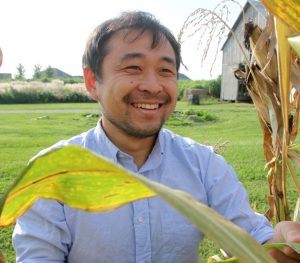
Kaiyu Guan
Assistant Professor, Department of Natural Resources and Environmental Sciences, University of Illinois
Dr. Guan provides solutions for real-life problems, such as large-scale crop monitoring and forecasting, water management and sustainability, and global food security. He uses satellite data, computational models, field work, and machine learning approaches to address how climate and human practices affect crop productivity, water resource availability, and ecosystem functioning.
invited Speakers
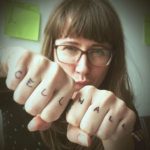
Siobhan A. Braybrook
Assistant Professor of Molecular, Cell and Developmental Biology, UCLA
The Braybrook Group at UCLA studies the generation of form in walled organisms: plants and algae. Her research has two main goals: 1) to understand the mechanics of shape growth in plants and algae, and 2) to understand the cell wall as a dynamic composite material.
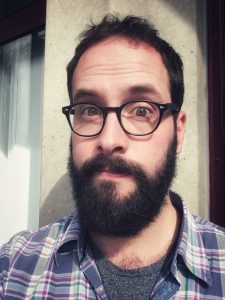
Guillaume Lobet
Assistant Professo, Forschungszentrum Jülich (IBG3, Agrosphere) and the Université catholique de Louvain (Earth and Life Institute)
The aim of Guillaume’s research is (i) to understand how various signals that carry information are interacting and being conveyed and integrated at the plant level and (ii) to amplify discrete physiological knowledge into functional plant processes. All of that using Functional Structural Plant Models.
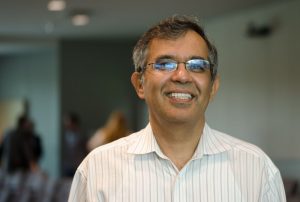
Nirav Merchant
Director, UA Data Science Institute (Data7) Co-PI, CyVerse Image Informatics (Interim), University of Arizona
Nirav’s research focuses on developing scalable platforms for supporting open science and open innovation, with emphasis on improving research productivity for geographically distributed interdisciplinary teams. His interests include large-scale data management platforms, data delivery technologies, managed sensor and mobile platforms for health interventions, workforce development, and project based learning.
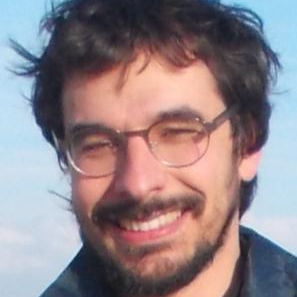
Christophe Pradal
Researcher in Plant Modelling and Computer Science, UMR AGAP, Univiversité de Montpellier, CIRAD, INRA, Inria
Christophe has developed software for plant modelling including OpenALEA, a scalable, modular and open software platform for plant modeling and simulation and V-Plants, the software components of Virtual Plants. He also specializes in geometrical and topological modeling for plant representation and scientific workflow and software engineering.
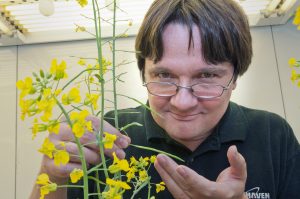
Jörg Schwender
Principal Investigator, Biology, Brookhaven National Laboratory
The Schwender group is interested in increasing the basic understanding of control and regulation of plant central metabolism, with focus on heterotrophic sink tissues like seeds. They use isotope labeling experiments, mathematical models and computer simulation to describe and analyze metabolism quantitatively.
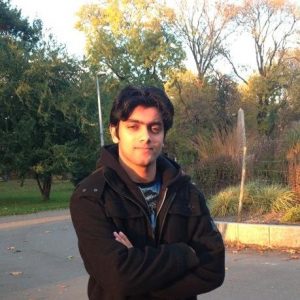
Sanu Shameer
Post-doctoral Research Assistant, Department of Plant Sciences, University of Oxford
Sanu’s research aims to develop a better understanding of the behavior of the metabolic systems of plants in order to devise metabolic engineering strategies that will improve the productivity and quality of crop plants. He uses both computational and experimental approaches to achieve this.
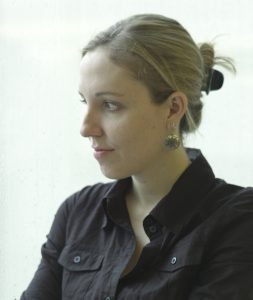
Carly Strasser
Carly Strasser
Director of Academic Alliances and Data Strategy, Fred Hutchinson Cancer Research Center
Carly Strasser specializes in creating new opportunities for and promoting collaborative research.
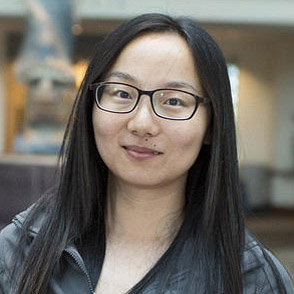
Yu Wang
Postdoctoral Research Associate, University of Illinois
Yu Wang is a postdoctoral researcher at the University of Illinois. Her research focuses on the metabolic modeling of the photosynthetic process in plants.
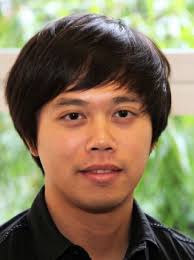
Alex Wu
Research Officer, Centre for Crop Science, Queensland Alliance for Agriculture and Food Innovation
Alex conducts research on the physiology and genetics of complex adaptive traits in field crops. He developed the Diurnal Canopy Photosynthesis Simulator (DCaPS) online application, which calculates diurnal canopy CO2 assimilation and daily biomass increment for a crop under well-watered conditions.

